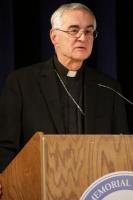'Christ, Yes … Or Christ, No'
On March 17, the Diocese of Evansville hosted the eighth of 10 roundtables held across North America on the relevance today of the teachings and thought of the late Father Luigi Giussani, who founded the movement Communion & Liberation.
Biographer Alberto Savorana, who wrote “The Life of Luigi Giussani,” joined the Most Rev. Steven J. Raica, bishop of the Diocese of Gaylord, Michigan; educator Stephanie Stokman from Madison, Wisconsin; and moderator Emily Freeman of Annunciation Parish in Evansville for the roundtable, which was hosted by Reitz Memorial High School.
Savorana told attendees that Father Giussani’s thought and perspective on life and reality could be found in the most basic of decisions facing all of us: Christ, yes … or Christ, no.
“Because the Word became flesh, beauty became flesh … truth became flesh,” Savorana said of Father Giussani’s viewpoint. “For all of us, the decision comes down to, “Christ, yes … or Christ, no.”
Bishop Raica and Stokman joined Savorana for presentations on Father Giussani, and the impacts of his views and teachings.
Bishop Raica said he served 20 years as a priest before he discovered Father Giusanni’s writings. “I never met him, but I have met those who know him – and they have not disappointed me,” he said. Of Savorana’s biography, he said “It’s as if I had a favorite uncle telling me to look more deeply into life and reality.
“In spite of the dramatic issues facing the Church today, people continue to encounter Christ in the least expected of ways and are drawn to him. That often happens through the witness of others,” Bishop Raica added.
Stokman discussed her journey through a variety of educational models, beginning with Montessori and continuing to other methods. In Father Giussani’s work, she said, she found viewpoints that helped answer, for her, questions regarding the goal of education and what actually is worth teaching.
“As I read Father Giussani’s work and learned more from it,” she said, “I realized that, as our children’s primary teachers, the way we do things in our lives says something to our children about our faith. So how do we educate our children to a true relationship with God? I invite my children into the life I live with Christ.”
Stokman talked about something that has become, for her, a truly important educational tool. “I ask, ‘How was your day?’” she said. She asks that question daily when she and her family gather for dinner and share time that is more quiet and less anxious that many other parts of “normal” days in the world of 2019.
“We talk about people and situations we encountered that day and how we were impacted by them,” she explained. “This is the stuff of life. Our children need to know that reality is full of life. I ask them what they are grateful for; and my 3-year-old is simply, whole-heartedly grateful that things … just are.”
Stokman said that Father Giussani’s work has helped her to see the real importance of all elements of life, even those that many see as small and insignificant. “I pray that my life, like Father Giusanni’s, may be a true sign of Christ.”
Savorana’s biography and this series of roundtables offer perspectives founded in the writings and thought of Communion & Liberation’s founder that address major questions facing Catholics today:
- How do we educate our youth?
- What is the role of the lay Christian in the life of the Church?
- What is the role of the Church in the world?
Bishop Raica, Stokman, Savorana and the presenters at the other roundtables across North American offered their thoughts on the relevance of Father Giusanni’s work today.
More about Father Giusanni, and Communion & Liberation
Communion & Liberation is a movement inspired by the thought and experience of Father Giussani. Its name describes the movement’s presence in the world – an experience of faith in God lived in communion, which is a person’s true liberation.
Online biographies explain that Father Giussani emphasized that Christianity began as a relationship with a particular individual, Jesus of Nazareth, and that the morals and theology of the Church are an outgrowth of this relationship. The central reality of faith is a relationship with Jesus as He becomes visible within reality.
Father Giussani’s teachings also emphasize that the primary goal of a Christian life is to grow in maturity in the relationship with God. He taught that this becomes possible when one sees all of reality as an incarnation of one's own individual relationship with God.
Communion & Liberation is present in about 90 countries on nearly every continent, and in more than 40 U.S. states.





